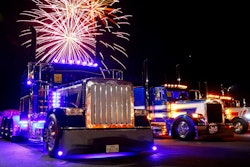
Since being announced late last year, more than 100 companies have expressed interest in being part of the federal government’s plan to create truck driver training apprenticeships for 18-20-year-olds who are seeking jobs in the trucking industry.
The departments of Transportation and Labor announced the 90 Day Trucking Apprenticeship Challenge to rapidly create registered apprenticeships as a way to help employers attract and train younger drivers, who are, under current laws, not allowed to drive in interstate commerce.
Last week, FMCSA took the first step in establishing the program by requesting emergency approval for an information collection request from the White House Office of Management and Budget. Once approved, FMCSA will seek OMB approval for the full three-year period.
Once the program is implemented, FMCSA will publish on its website an announcement that applications are open for participation in the program. No more than 3,000 apprentices will be allowed to participate in the pilot at any one time, and FMCSA estimates that it will need a maximum of 1,000 motor carriers to participate to hire the pilot program participants.
Carriers who are approved to participate will be required to submit monthly data on an apprentice’s driver activity, safety outcomes, and any additional supporting information, such as from onboard monitoring systems.
However, there is a divergence of opinion about whether to allow younger drivers to drive across state lines. More than 140 individuals, businesses and organizations weigh in.
These folks think it’s a good idea

Glen Kreuger: I work for a company with a very extensive new driver training program. We have excellent trainers and we care about making sure the new driver is going to be safe on the road. I have no doubt 18-20 year-olds could be safe with proper training. Thanks to technology they can be watched closely. Require an ELD and camera in the truck for 18-20 year-olds and restrict them to shorthaul operations daily until they are 21 if the public needs to see some restriction on them.
Luis Gonzales: My comment is simple...if an 18-year-old can serve in the military and fight for his country, then an 18-year-old should be allowed to drive out of state.
Sarah Cohen: Thankful for this being looked into. I’ve been in the transportation industry 22 years and capacity has never been worse. We need to do something, this is a step in the right direction. I’ve never understood the reasoning in limiting drivers under 21 to operate in-state only. Does a driver drive differently when they cross the State line? No.
Dave Dein: As the truck driving school coordinator and instructor for Patterson High School (Patterson, California) I am in favor of the DRIVE-Safe Apprenticeship Pilot Program. There are many misconceptions of what it means to be a younger driver. What needs to be on the forefront of this discussion is to not just compare all drivers under the age of 21, but to compare those who have been properly trained to those who have not. Students of the Patterson program undergo 180 hours of classroom instruction and 30 hours of driving simulator training. It is only those who met the standards and proved that they are dedicated and committed to the process are then allowed to begin the behind-the-wheel training which is an additional 110 hours. The proposed pilot program is a graduated program that will ensure that students are meeting standards before being allowed to move onto the next level. This pilot program is vital in obtaining the necessary safety data needed rather than lumping all drivers under the age of 21 and deeming them unsafe based solely on age rather than on type and quality of training.
Tim Kordula: I have to wonder after reading some of the comments, if those who are so negative have actually read the guts of the Drive-safe-Act? We belong to the largest industry nobody knows anything about and whose fault is that? Ours of course, but we have the capability of educating the public. The average age of drivers in the trucking industry is 49-54 years old, the average age coming in is about the same. Doctors, Lawyers and a lot of blue collar workers enter other fields at 18, 19 and 20 years old. Including fighting for our country! Read the Act! We are not looking at taking 18 year old drivers and sending them coast to coast. How many out there know the true definition of interstate freight? There are companies that have routes that are only 5o miles long, but the younger drivers cannot haul the product because the freight is destined to cross state lines. Look at the amount of probationary time required of these drivers, look at the technology that has to be in place for these drivers. We need to move this industry's age lower, we need to redefine what being in the transportation industry is. Bringing these young smart drivers into the industry I see as nothing but a huge plus and benefit. We need to move on this so we can move the country. There are pilot programs out there now that are successful. Look at them, watch what they do. I am all for it! Bring it on!
Boyd Company: I am supportive of the Apprenticeship Pilot Program that the infrastructure bill authorized a three-year pilot program, based on the DRIVE-Safe Act, to authorize up to 3,000 18 to 20-year-olds to undergo advanced safety training to participate in interstate commerce. We know that truck drivers are an aging workforce and our goal is to reach the next generation for the trucking industry to create a skilled, diverse workforce.We need additional drivers and need to support our youth that want a career and are not interested in attending university. As the Caterpillar dealer in Kentucky, West Virginia, southern Indiana, and southeastern Ohio, we rely on over the road trucks to transport our Caterpillar equipment and generators to our customers that support and build this country's infrastructure. This pilot program would allow for more drivers to assist with not only our transportation needs as a Caterpillar dealer but assist with all the other amazing companies that rely on transportation and logistics to build our country.
Boshart Trucking: I support this pilot program. The data collected will provide information from which to evaluate the safety and feasibility of program expansion. Providing 18-21 year old CDL permitted drivers with 240 hours (equivalent to 6, 40 hour weeks) of supervised driving will provide new drivers with additional experience and training that helps them expand their skills.
Surprise Trucking: This is a horrible idea at this time. We can't even get properly trained new entrants into this industry which has caused a very dangerous atmosphere. Until that is under control this is a bad idea.
Next Generation Trucking: The Next Generation in Trucking Association is in favor of the Drive-SAFE Act. We support proper training of 18-20 year olds who are good fits to be truck drivers and will have long, safe careers in the trucking industry. A partner of ours, JoBehaviors helps to identify those who will be likely to be safe drivers and more likely to be retained as truck drivers. That is a starting point to get young people into trucking, then going through a well-formed training program and finally the Drive-SAFE Act apprenticeship program will make 18-20 year olds more successful in the industry then a 21 year old coming in without the extra intention, focus and training. The trucking industry needs a skilled, diverse workforce and that is what he hopes to provide. We hope the Drive-SAFE Act Pilot Program will identify those 18-20 years olds that are serious about a career in trucking and will be trained from the beginning to form good habits and be safe drivers. With supply chain issues and an aging workforce the time to act is now. We are very excited about this pilot program and are going to support getting these 3,000 positions filled. We understand that we need to have data on young professional drivers and I hope this gets us to that.
These folks think it’s a bad idea

Matthew Hubble: Allowing under 21 drivers will further erode experienced driver compensation by adding an influx of new (rookie), younger drivers that companies will feel they can pay less for the same kind of work us experienced drivers are doing. It will also continue to erode safety.
David Wiggins: I realize that the country needs more drivers but putting a kid behind the wheel of an 80,000-pound bomb is not the answer. The reason the country needs drivers is because a lot of the old hands like myself get tired and retire and not enough new people come to the job because of all the BS that goes with it.
Jim Burness: I really think it is not a good idea, and to be honest FMCSA should try talking to little people like myself instead of big super companies with huge wallets.
Rebecca Long: I do not agree with this. There is a reason for the age the way it is. It's called responsibility.
Daniel Waters: The human brain doesn’t reach full maturity until age 25. This is a scientifically proven fact. The last thing this country needs is immature drivers hauling 40 tons on the national roadways. The president needs to intercede with logistical warehousing issues, not an imaginary driver shortage. Bad logistics management at shippers and receivers is the issue that needs Federal intervention or incentives. To streamline and decrease wait times at shippers and receivers. I believe shipping/receiving warehouses, port terminals should receive a hefty federal penalty. For delaying trucks at the loading/unloading docks. The most efficient manner to move freight is for class A licensed truck drivers to move preloaded commercial trailers. The FMCSA should be asking President Biden’s cabinet to focus on this issue.
Angela Andrews: This is a poor idea that will get people killed. We already have catastrophic accidents being perpetrated by older experienced drivers. What is going to happen when you send these kids out on the road with these huge heavy vehicles? This is not going to help. It’s going to be a disaster. And your names will forever be associated with it.
John Henderson: I oppose the proposal to allow 18-21-year-old drivers to go interstate driving. The proposal is based on the false premise there is a shortage of qualified drivers. It is an attempt by the mega carriers and their allies to continue their "meat in the seat practices" which have created the illusion of a driver shortage. There are 100,000 plus CDL's issued every year. If carriers and shippers/receivers treated the drivers like valued employees instead of like meat in the seat it would reduce the number of drivers who leave the industry each year.. What happens when they grind up the available 18-21-year-old drivers, do they next propose allowing 15-17-year-old drivers interstate travel? This proposal only masks the real problem with the industry which is driver churning caused by poor treatment of the current driver pool.
Joseph Turner: 18 to 20-year-olds, just aren't mentally ready to be put behind the wheels of 80,000 lb vehicles that one little mistake can cause numerous injuries or deaths to automobile drivers and other truck drivers.people at that age can't give their 100 % attention to driving a vehicle for 11 hrs a day without making mistakes, they haven't been driving a car but 2 or 3 years and haven't mastered that all together at that age.
David Ulrich: I think that letting teens behind the wheel of a CMV weighing up to 80,000 pounds plus is asking for accidents. I'm a 34 year OTR driver. If the big fleet companies need drivers, maybe they need to pay more to keep the drivers they have and downsize their fleet if they don't have drivers for the trucks they have. Let the independent owner-operator truck drivers start picking up and delivering loads more, Without being undercut by big fleet rates.
Robert Spoon: This program will accomplish both putting more unsafe divers on the road and putting young people with little to no life experience in the meat grinder that is mega-carrier training programs. It’s just a way for big companies who are self-insured to pay low wages to young inexperienced drivers. Young people need to be highly supervised by competent people for long periods of time. This program will not do that. It has poor standards in an industry that needs high meaningful standards it will fail and failure here has the potential of costing lives. The industry outside of the large mega-carriers do not want this program. For once how about listening to the majority of the industry? Young people have poor critical decision-making skills when left with no or little supervision. I was in the military for 22 years. I trained many young men and women but that training takes time and repetition over years not weeks. There is no driver shortage, it's a myth. Listen to those of us out here with the real world experience and do not go forward with this program.
Michael Delozier: As a person who had held a commercial license from the time I was 16 ( it was legal in Ca back then) I am now retired at 63 years old and learned to drive in the fields and orchards at 14 years old traveled drove intrastate for 2 summers and coast to coast with my father for 9 months before t was allowed to go by myself at 18. I had years of training. I could secure a load before I learned to drive that will not be taught in truck driving school. I knew how to handle myself in adult situations at shippers, receivers and at truck stops. These are not places to put an immature person; other drivers will take advantage of them, especially young females. Your proposed training time is not enough 400 hours is 40 days is not enough companies will toss those young people out like meat to the lions. They are in the business of making money and that cannot be done paying someone to train for 6 months. The major companies have trainers with 6 months experience. You are setting these young people up for failure and worse.
Pitbull Trucking: No, please. It will be too dangerous because they will put others at risk. Truck driving is not easy especially when you're less than 21 years old. You don't think wisely at that age, so I would definitely not let them drive if they're under 21.
Walsh Trucking, Inc.: In my opinion, this is a terrible idea. That age group is not responsible enough to realize the dangers to both public and personal life. It’s already dangerous enough out on the roads with the skill levels of drivers out there. As an owner/op of 18 years,I condemn this action by the FMCSA.
These folks have other ideas

Randy Harrington: There is no need to allow 18-20 to drive in interstate commerce. If companies would pay drivers what we are worth and for all the time away from home and would get us home when they are supposed to there would be plenty of drivers older than 21 to fill seats. All this will do is allow companies to keep treating drivers poorly and underpaying us along with not giving us much deserved hometime.
David Caddell: The first thing that you need to do is reduce the turnover rate, and include the shippers and receivers into the game, they should be required to load and unload us within 30 minutes and required to pay us an amount equal to what we earn driving, and we need more parking spaces, as for this, you can make it easier for truck stops to build facilities and give them tax breaks for free parking, and build more rest areas.
Dan Humm: I’ve been driving for 39.5 years, I have a stepson who’s been driving ( as a child he pretended in his car seat in the back of my pickup) I feel pretty confident he can handle a truck and trailer, he’s driven several commercial simulators and done amazing, he’s moved and parked, hooked and unhooked trailers. In March he will be 18, I will in no shape or form allow him to leave our state, there are way too many variables being on the road overnight for weeks on end. The fatigue alone will push them to forget or make possible deadly mistakes. What happens when several of these 18-year-olds are involved in deadly crashes, these kids have only had their driver's license for two years and now expect them to be professional drivers moving 80,000 lbs loads? We never had a shortage of trucks prior to COVID now all of a sudden we do, how about getting the trucks loaded quickly now rather than wait up to days to get loaded. My son will absolutely tell you he’s gonna drive a truck when he’s 18, but only in Michigan until he gets some experience. In my opinion, he's smarter than these guys trying to push this through.
Todd Ecton: This sounds like typical government misdirection. The problems with the supply chain aren't because there aren't enough trucks on the road. However, there is a woeful shortage of competent drivers, places to park and a practical hours of service system. Shipper and receiver protocols are ridiculously inept and are allowed to waste our time with no real consequence. The people making and passing these laws have no practical experience in the field and use the general public disdain for trucks and truck drivers to consistently come to the trucking industry to exact their pound of flesh. How about we take pride in our profession, be professional and y'all concentrate on fixing the existing problems within our industry.
Phill Killerlain: I would like to see the training period be longer. More like an apprenticeship program with at least six months and two of those must be in winter in the northwest mountains area or a skid pad course to replace it.












